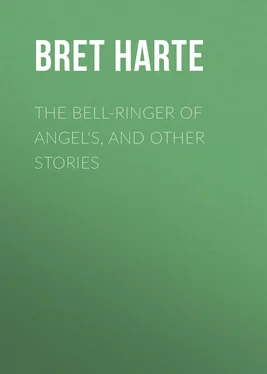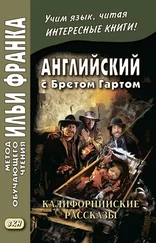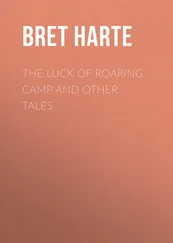Bret Harte - The Bell-Ringer of Angel's, and Other Stories
Здесь есть возможность читать онлайн «Bret Harte - The Bell-Ringer of Angel's, and Other Stories» — ознакомительный отрывок электронной книги совершенно бесплатно, а после прочтения отрывка купить полную версию. В некоторых случаях можно слушать аудио, скачать через торрент в формате fb2 и присутствует краткое содержание. Издательство: Иностранный паблик, Жанр: foreign_sf, literature_19, foreign_antique, foreign_prose, на английском языке. Описание произведения, (предисловие) а так же отзывы посетителей доступны на портале библиотеки ЛибКат.
- Название:The Bell-Ringer of Angel's, and Other Stories
- Автор:
- Издательство:Иностранный паблик
- Жанр:
- Год:неизвестен
- ISBN:нет данных
- Рейтинг книги:4 / 5. Голосов: 1
-
Избранное:Добавить в избранное
- Отзывы:
-
Ваша оценка:
- 80
- 1
- 2
- 3
- 4
- 5
The Bell-Ringer of Angel's, and Other Stories: краткое содержание, описание и аннотация
Предлагаем к чтению аннотацию, описание, краткое содержание или предисловие (зависит от того, что написал сам автор книги «The Bell-Ringer of Angel's, and Other Stories»). Если вы не нашли необходимую информацию о книге — напишите в комментариях, мы постараемся отыскать её.
The Bell-Ringer of Angel's, and Other Stories — читать онлайн ознакомительный отрывок
Ниже представлен текст книги, разбитый по страницам. Система сохранения места последней прочитанной страницы, позволяет с удобством читать онлайн бесплатно книгу «The Bell-Ringer of Angel's, and Other Stories», без необходимости каждый раз заново искать на чём Вы остановились. Поставьте закладку, и сможете в любой момент перейти на страницу, на которой закончили чтение.
Интервал:
Закладка:
“I see—you thought I was riled?” said McGee quietly.
“No; I was thinking it was NIGHT BEFORE LAST! Of course it was last night. I must be getting silly.” He essayed a laugh—rare at any time with him—and so forced now that it affected McGee more than his embarrassment. He looked at Wayne thoughtfully, and then said slowly: “I reckon I did come upon you a little too sudden last night, but, you see, I was thinkin’ of suthin’ else and disremembered you might be there. But I wasn’t mad—no! no! and I only spoke about it now that you might be more keerful before folks. You follow me? You understand what I mean?”
He turned and walked to the door, when he halted. “You follow me, don’t you? It ain’t no cussedness o’ mine, or want o’ trustin’, don’t you see? Mebbe I oughtened have spoken. I oughter remembered that times this sort o’ thing must be rather rough on you and her. You follow me? You understand what I mean? Good-night.”
He walked slowly down the path towards the river. Had Madison Wayne been watching him, he would have noticed that his head was bent and his step less free. But Madison Wayne was at that moment sitting rigidly in his chair, nursing, with all the gloomy concentration of a monastic nature, a single terrible suspicion.
CHAPTER IV
Howbeit the sun shone cheerfully over the Bar the next morning and the next; the breath of life and activity was in the air; the settlement never had been more prosperous, and the yield from the opened placers on the drained river-bed that week was enormous. The Brothers Wayne were said to be “rolling in gold.” It was thought to be consistent with Madison Wayne’s nature that there was no trace of good fortune in his face or manner—rather that he had become more nervous, restless, and gloomy. This was attributed to the joylessness of avarice as contrasted with the spendthrift gayety of the more liberal Arthur, and he was feared and RESPECTED as a miser. His long, solitary walks around the promontory, his incessant watchfulness, his reticence when questioned, were all recognized as the indications of a man whose soul was absorbed in money-getting. The reverence they failed to yield to his religious isolation they were willing to freely accord to his financial abstraction. But Mr. McGee was not so deceived. Overtaking him one day under the fringe of willows, he characteristically chided him with absenting himself from Mrs. McGee and her house since their last interview.
“I reckon you did not harbor malice in your Christianity,” he said; “but it looks mighty like ez if ye was throwing off on Safie and me on account of what I said.”
In vain Madison gloomily and almost sternly protested.
McGee looked him all over with his clear measuring eye, and for some minutes was singularly silent. At last he said slowly: “I’ve been thinkin’ suthin’ o’ goin’ down to ‘Frisco, and I’d be a heap easier in my mind ef you’d promise to look arter Safie now and then.”
“You surely are not going to leave her here ALONE?” said Wayne roughly.
“Why not?”
For an instant Wayne hesitated. Then he burst out. “For a hundred reasons! If she ever wanted your protection, before, she surely does now. Do you suppose the Bar is any less heathen or more regenerated than it was when you thought it necessary to guard her with your revolver? Man! It is a hundred times worse than then! The new claims have filled it with spying adventurers—with wolves like Hamlin and his friends—idolaters who would set up Baal and Ashteroth here—and fill your tents with the curses of Sodom!”
Perhaps it was owing to the Scriptural phrasing, perhaps it was from some unusual authority of the man’s manner, but a look of approving relief and admiration came into McGee’s clear eyes.
“And YOU’RE just the man to tackle ‘em,” he said, clapping his hand on Wayne’s shoulder. “That’s your gait—keep it up! But,” he added, in a lower voice, “me and my revolver are played out.” There was a strangeness in the tone that arrested Wayne’s attention. “Yes,” continued McGee, stroking his beard slowly, “men like me has their day, and revolvers has theirs; the world turns round and the Bar fills up, and this yer river changes its course—and it’s all in the day’s work. You understand what I mean—you follow me? And if anything should happen to me—not that it’s like to; but it’s in the way o’ men—I want you to look arter Safie. It ain’t every woman ez has two men, ez like and unlike, to guard her. You follow me—you understand what I mean, don’t you?” With these words he parted somewhat abruptly from Wayne, turning into the steep path to the promontory crest and leaving his companion lost in gloomy abstraction. The next day Alexander McGee had departed on a business trip to San Francisco.
In his present frame of mind, with his new responsibility and the carrying out of a plan which he had vaguely conceived might remove the terrible idea that had taken possession of him, Madison Wayne was even relieved when his brother also announced his intention of going to Angel’s for a few days.
For since his memorable interview with McGee he had been convinced that Safie had been clandestinely visited by some one. Whether it was the thoughtless and momentary indiscretion of a willful woman, or the sequel to some deliberately planned intrigue, did not concern him so much as the falsity of his own position, and the conniving lie by which he had saved her and her lover. That at this crucial moment he had failed to “testify” to guilt and wickedness; that he firmly believed—such is the inordinate vanity of the religious zealot—that he had denied Him in his effort to shield HER; and that he had broken faith with the husband who had entrusted to him the custody of his wife’s honor, seemed to him more terrible than her faithlessness. In his first horror he had dreaded to see her, lest her very confession—he knew her reckless frankness towards himself—should reveal to him the extent of his complicity. But since then, and during her husband’s absence, he had convinced himself that it was his duty to wrestle and strive with her weak spirit, to implore her to reveal her new intrigue to her husband, and then he would help her to sue for his forgiveness. It was a part of the inconsistency of his religious convictions; in his human passion he was perfectly unselfish, and had already forgiven her the offense against himself. He would see her at once!
But it happened to be a quiet, intense night, with the tremulous opulence of a full moon that threw quivering shafts of light like summer lightning over the blue river, and laid a wonderful carpet of intricate lace along the path that wound through the willows to the crest. There was the dry, stimulating dust and spice of heated pines from below; the languorous odors of syringa; the faint, feminine smell of southernwood, and the infinite mystery of silence. This silence was at times softly broken with the tender inarticulate whisper of falling leaves, broken sighs from the tree-tops, and the languid stretching of wakened and unclasping boughs. Madison Wayne had not, alas! taken into account this subtle conspiracy of Night and Nature, and as he climbed higher, his steps began to falter with new and strange sensations. The rigidity of purpose which had guided the hard religious convictions that always sustained him, began to relax. A tender sympathy stole over him; a loving mercy to himself as well as others stole into his heart. He thought of HER as she had nestled at his side, hand in hand, upon the moonlit veranda of her father’s house, before his hard convictions had chilled and affrighted her. He thought of her fresh simplicity, and what had seemed to him her wonderful girlish beauty, and lo! in a quick turn of the path he stood breathless and tremulous before the house. The moonbeams lay tenderly upon the peaceful eaves; the long blossoms of the Madeira vine seemed sleeping also. The pink flush of the Cherokee rose in the unreal light had become chastely white.
Читать дальшеИнтервал:
Закладка:
Похожие книги на «The Bell-Ringer of Angel's, and Other Stories»
Представляем Вашему вниманию похожие книги на «The Bell-Ringer of Angel's, and Other Stories» списком для выбора. Мы отобрали схожую по названию и смыслу литературу в надежде предоставить читателям больше вариантов отыскать новые, интересные, ещё непрочитанные произведения.
Обсуждение, отзывы о книге «The Bell-Ringer of Angel's, and Other Stories» и просто собственные мнения читателей. Оставьте ваши комментарии, напишите, что Вы думаете о произведении, его смысле или главных героях. Укажите что конкретно понравилось, а что нет, и почему Вы так считаете.












